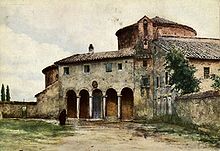Santo Stefano al Monte Celio
| Basilica of Saint Stephen in the Round on the Celian Hill Basilica di Santo Stefano al Monte Celio (Italian) Basilica S. Stephani in Caelio Monte (Latin) |
|
|---|---|

Santo Stefano Rotondo in a painting by Ettore Roesler Franz in the 19th century.
|
|
| Basic information | |
| Location | Rome, Italy |
| Geographic coordinates | 41°53′04″N 12°29′48″E / 41.88444°N 12.49667°ECoordinates: 41°53′04″N 12°29′48″E / 41.88444°N 12.49667°E |
| Affiliation | Roman Catholic |
| Country | Italy |
| Year consecrated | ca. 470 |
| Ecclesiastical or organizational status | Minor basilica, Titular, Rectory church, Hungary's "national church" in Rome |
| Leadership | Friedrich Wetter |
| Website | Official Website |
| Architectural description | |
| Architectural type | Church |
| Architectural style | Roman |
| Groundbreaking | 5th century |
| Specifications | |
| Direction of façade | North |
| Length | 80 metres (260 ft) |
| Width | 45 metres (148 ft) |
| Width (nave) | 20 metres (66 ft) |
The Basilica of St. Stephen in the Round on the Celian Hill (Italian: Basilica di Santo Stefano al Monte Celio, Latin: Basilica S. Stephani in Caelio Monte) is an ancient basilica and titular church in Rome, Italy. Commonly named Santo Stefano Rotondo, the church is Hungary's "national church" in Rome, dedicated to both Saint Stephen, the Christian first martyr, and Stephen I, the sanctified first king of Hungary who imposed Christianity on his subjects. The minor basilica is also the rectory church of the Pontifical Collegium Germanicum et Hungaricum.
As of 2005[update], the Cardinal Priest or titular S. Stephano is Friedrich Wetter.
The earliest church was consecrated by Pope Simplicius between 468 and 483. It was dedicated to the protomartyr Saint Stephen, whose body had been discovered a few decades before in the Holy Land, and brought to Rome. The church was the first in Rome to have a circular plan, inspired by the Church of the Holy Sepulchre in Jerusalem. Saint Stefano was probably financed by the wealthy Valerius family, whose estates covered large parts of the Caelian Hill. Their villa stood nearby, on the site of the present-day Hospital of San Giovanni - Addolorata. Saint Melania the Elder, a member of the family, was a frequent pilgrim to Jerusalem and died there, so the family had connections to the Holy Land.
...
Wikipedia
